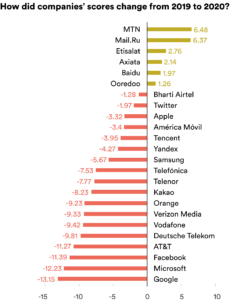
Original art by Paweł Kuczyński, used with permission.
This is the RADAR, Ranking Digital Rights’ newsletter. This special edition was sent on March 3, 2021. Subscribe here to get The RADAR by email.
Google, Microsoft, Facebook, and Yahoo’s parent company (now Verizon Media) have dominated our rankings of digital platforms since 2015. But in 2020, things changed.
For the first time, Twitter rose to the top. Google fell to fourth place, declining by more than 13 percentage points, and Facebook fell to fifth place, declining by more than 11 points. Google also earned the dubious distinction of showing the greatest score decline of all the companies we rank, with Microsoft and Facebook next in line.

Difference in total scores between 2019 and 2020 RDR Indexes. Learn more.
What caused their scores to drop so dramatically? The short answer is that these companies—and almost all the others we rank—showed no signs of maintaining adequate oversight or due diligence when it comes to their targeted ads and algorithms.
Although our research has always taken algorithms into account, we introduced new standards in 2020 that measure companies’ transparency and commitments to respecting human rights when building and deploying algorithmic systems. On average, these new indicators caused a five-point drop in companies’ scores.
Among all the companies we ranked in 2020, only Spain’s Telefónica and the U.K.-based Vodafone made commitments to uphold human rights in these processes. At the other end of the spectrum, we found companies like Google and Facebook, whose business models depend heavily on targeted advertising and algorithmic amplification of content—major drivers of disinformation and extremist content. These companies disclosed little to the public about how these systems work or how they assess their impact on human rights. They also offered users little to no control over how their data is collected and used to fuel these processes.
Spotlight on algorithms: Moving fast and breaking us all
In one of three featured essays that accompany the 2020 RDR Index, RDR Editorial Director Ellery Roberts Biddle and Research Analyst Jie Zhang offer a short tour of RDR’s findings in this new area, along with examples of the more apparent harms that algorithms can trigger.
“….[Our research suggests that] many of the world’s most powerful algorithms are accountable to no one—not even the companies that build and deploy them.
Some have made vague pledges to “be ethical,” and for all we know, there may be strong policies or rules that the companies follow behind closed doors. But the overall lack of public explanation of how these systems are built and run indicates that companies do not have oversight over how their own systems work. In light of the enormous effects that they have on human rights, public health, public safety, democracy, and our understanding of reality, this is nothing short of reckless.
For the 2020 RDR Index, we looked for companies’ answers to some fundamental questions about algorithms: How do you build and train them? What do they do? What standards guide these processes?
We combed the public-facing documentation and, to no surprise, found very, very little. Yet companies are harvesting user data by the minute, to fuel algorithmic optimization, engagement, and personalization—all things that translate to enormous profits.”
Where to find us
Yale Law School and Wikimedia Initiative | Alternative Regulatory Responses to Misinformation
March 12 at 12:00 PM EST | Register here
RDR Company Engagement Lead Jan Rydzak and Senior Policy Consultant Elizabeth M. Renieris will discuss their new paper, Better Processes Lead to Better Outcomes, at the Yale Law School and Wikimedia Initiative on Intermediaries and Information, a co-hosted series on regulatory responses to misinformation.
MozFest | Spotlight on Artificial Intelligence & Freedom of Expression: Shaping Online Content with the OSCE and Access Now
March 16 at 1:00 PM EST | Register here
RDR Research Director Amy Brouillette will join a workshop led by the OSCE, Access Now, and Vote Rookie to discuss what should be done to better protect free speech online.
CIPE Philippines | Putting Digital Rights on the Corporate Governance Agenda
March 23 at 9:00 PM EST | Register here
RDR Founding Director Rebecca MacKinnon will join the Center for International Private Enterprise, a core institute of the National Endowment for Democracy, to discuss technology’s role in democratic society in Southeast Asia.
The Policy Circle | Big Tech Tightrope: Balancing Free Speech, Privacy & Innovation
March 24 at 1:00 PM EST | Register here
Rebecca MacKinnon will join Steve DelBianco, president of NetChoice, and Jillian York, director of International Freedom of Expression at the Electronic Frontier Foundation, to discuss the fundamentals of free speech on social media and public policy reforms for big tech companies.
Subscribe here to get The RADAR by email.




